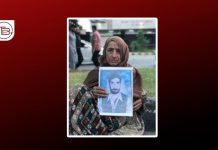Baloch social media activists organized an online campaign to commemorate 28th May as “Black Day” in remembrance of Pakistan’s nuclear tests in Chaghi, Balochistan, in 1998.
On this day in 1998, the Pakistani authorities announced that they had successfully tested their first nuclear bombs in the Raskoh region of Chaghi, Balochistan. Not many were aware that the nuclear tests will leave long-lasting impacts on the region and the areas surrounding it.
Twenty-three years later, the people of the region still suffer from lethal skin cancer and other life-threatening diseases, a direct consequence of Pakistan’s nuclear tests in the region. A huge number of children are born with multiple disabilities as an impact of the radiation that still pervades much of the mountainous range and the atmosphere.
According to the locals, the livestock and wildlife have also suffered from the radiation of nuclear bombs.
Nuclear bombs use fissile radioactive material as an explosive. As it explodes, the destructive bomb sends superfast projectiles in its surrounding areas, thus showering the region with radioactive shrapnel. This material decays at an infinitesimally slow rate and can last for thousands of years.
Radioactive shrapnel continuously emits deadly radiation. This radiation hits the DNA of any living organism as a superfast microscopic bullet, breaking it at several places. This induces deleterious mutations in the DNA which causes the cells to multiply uncontrollably, and cancer is born.
Nuclear explosions like the one conducted in Chaghi in 1988 can have deadly effects for several generations, thus negatively affecting the quality of life for the inhabitants of the region.
To raise awareness about the impact of the nuclear tests in the region, the Baloch National Movement (BNM), the largest pro-independence Political party of Balochistan, announced an online campaign about the aftermath of the nuclear tests in Balochistan, by using the hashtag #NukeAfterMathInBalochista. Participating in the campaign, the BNM chairman tweeted: “Twenty-eight May is a black day in Baloch history. This day Pakistan tested its nuclear weapons in Chaghi Balochistan, leaving the Baloch people to suffer from its radiations. Its effects are still causing serious health problems in Balochistan. The world must speak against it and help Baloch people to recover from its after effects.”
Dr Naseem Baloch, internationally leading the BNM, tweeted on the occasion saying: “On this day, in 1998, Pakistan tested its nukes in Balochistan without consent of Baloch people. We are facing its aftermath since 23 years. Cancers and other diseases have become common in Balochistan. #IAEA must investigate”
Baloch student organisation – Azad also participated in the campaign and tweeted from their official Twitter account, saying: “On 28 May 1998, Pakistan carried out several nuclear tests in areas of Chagi, Balochistan. Which shows the State hatred toward Baloch. Due to the afterMath of the tests till today Children are born with Skin cancers and other disabilities in Chagi.”
On the other hand, the official Twitter account of the DG ISPR tweeted about the nuclear testing program and said: “23 years ago on this day, Pakistan restored balance of power in the region by successfully establishing credible minimum nuclear deterrence. AFs and the nation pays tribute to all those involved in making this dream come true.”
Baloch political activists claim that the Pakistani state without the consent of the Baloch nation tested their nukes on the Baloch soil. They urged the international organisations working to prevent the nuclear program to “investigate the aftermath of nukes in Balochistan decently”.






























